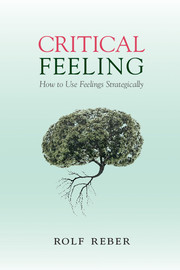Preface
Published online by Cambridge University Press: 05 March 2016
Summary
After walking my younger kids to school, I mounted the Vancouver SkyTrain at Sapperton Station on the morning of Monday December 14, 2009. As always, I took my current reading out of my backpack – on that day the book Effortless Action by Edward Slingerland (2003a), which analyzes the metaphorical nature of Confucian thought. I began thinking about what I read; my mind was wandering when all of a sudden an insight struck me: What Confucius wrote some 2500 years ago is critical feeling. Much has been written about critical thinking, but to my knowledge not one scholar has ever written a comprehensive work about how feelings can be used to improve personal or societal outcomes. The deficiencies of critical thinking have also been extensively covered, and recent decades have seen an increasing number of works on the rationality of emotions. Despite these insights, we lack an overview of strategies that realize the potential of feelings to improve outcomes. Feelings go beyond emotions and encompass moods, preferences, metacognitive experiences, and bodily states, as will be defined in due course. This book introduces the concept of critical feeling and provides an overview of applications in various areas, from personal well-being and skill learning to the acquisition of artistic tastes and religious creeds.
Writing such a book is often a solitary affair but at the same time impossible without a host of colleagues and friends who take time to collaborate, discuss, criticize, and encourage. Within the five years since my decisive aha-experience, I have had the privilege of working with and discussing ideas with many people, some of whom I would like to mention by name. At the University of Bergen and later at the University of Oslo, I met wonderful colleagues and students who gave input from various perspectives relevant to the project; among these people were Michael Stausberg (who provided input on parts of Chapter 10), Morten Brun, Kevin Cahill, Per Olav Folgerø, Marina Hirnstein, Lasse Hodne, Sigve Høgheim, Kenneth Hugdahl, Christoph Kirfel, Geir Overskeid, Francisco Pons, Ole Martin Skilleås, Karsten Specht, and Matthias Stadler. Some of my research relevant to critical feeling has been made possible by grants from the Research Council of Norway (#166252 and #212299) as well as by a fellowship from the Leiv Eirikssons mobility program.
- Type
- Chapter
- Information
- Critical FeelingHow to Use Feelings Strategically, pp. xi - xiiPublisher: Cambridge University PressPrint publication year: 2016



